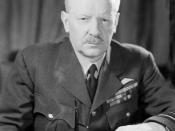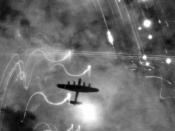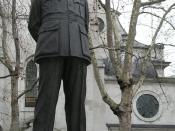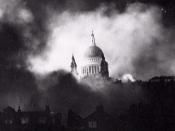Throughout World War II, Germany was heavily bombed. The public of Britain had great satisfaction when the Britain had taken its revenge against Germany for the campaign Blitz carried out by Germany fighter planes on London in 1940. This campaign was one of the most controversial aspects of the Second World War from 1942-1945. The really intensive bombing of Germany was a policy developed by the head of RAF Bomber Command, Arthur Harris in 1942.
Harris was committed to strategic bombing. This is because he believed that this would work and the bombing would demoralise German population as well as destroy vital industries, rail links and resources such as coal mines.
The first bombing campaigns were in France. The American B-17s and British Lancasters attacked the ports of Brest and Lorient, where the German submarine pens were. They destroyed the towns but left the submarines facilities untouched. When Roosevelt and Churchill met in January 1943, they were pressured by Stalin to equal the enormous efforts of the USSR against Germany.
In this meeting they decided that the bombing campaign would be intensified and that it would be focused on the targets in Germany. In the bombing, Berlin was bombed regularly from 1943 to 1945. The other cities such as Dresden were also bombed heavily. During 1943-44 RAF lost 10-15% of its planes and crews. The US forces suffered even higher losses.
Harris hoped to crush Germany and win the war in Europe by bombing Berlin. Germany survived the crisis. This is because the bombing did not break up the spirit of the factory workers who worked under temporary roofs and resumed production. Some also worked the machines in the open air.
Outcome of this campaign is quite a highly debated. This is because the Germany was still strong at the end of the campaign, despite the bombing.
From one view we can say that the RAF lost about 140,000 airmen and 21,000 planes. Bombing had a little effect on GermanyÃÂs war production. The German peopleÃÂs support for the war was strengthened rather than weakening. From the other view we can say that the bombing only slightly reduced GermanyÃÂs production. Bombing only used up 7% of UKÃÂs war resources. The bombing shortened the war.
Sourceshttp://en.wikipedia.org/wiki/Strategic_bombing_during_World_War_IIhttp://library.thinkquest.org/19090/info7a.html





